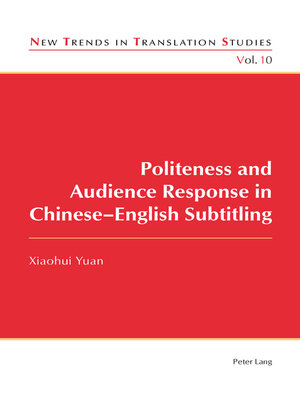Politeness and Audience Response in Chinese-English Subtitling
ebook ∣ New Trends In Translation Studies
By Jorge Díaz Cintas

Sign up to save your library
With an OverDrive account, you can save your favorite libraries for at-a-glance information about availability. Find out more about OverDrive accounts.
Find this title in Libby, the library reading app by OverDrive.



Search for a digital library with this title
Title found at these libraries:
| Library Name | Distance |
|---|---|
| Loading... |
The aim of this book is to study how politeness, and particularly face negotiation, is dealt with when subtitling between Chinese and English. Face negotiation refers to the process of managing relationships across different cultures through verbal and nonverbal interactions. This research specifically investigates how British and Chinese audiences respond to face management through a study focused on film subtitling and viewers' reception and response.
The book offers a survey of the developments in research on face management in Far East cultures and in the West. The author then presents a composite model of face management for analysing face interactions in selected Chinese and English film sequences as well as its representation in the corresponding subtitles. Support for the research is provided by audience response experiments conducted with six Chinese and six British subjects, using one-on-one interviews. The audience responses show that viewers who rely on subtitles gain a significantly different impression of the interlocutors' personality, attitude and intentions than those of native audiences. The results also demonstrate that the nature of the power relations between interlocutors changes from the original to the subtitled version.
The book offers a survey of the developments in research on face management in Far East cultures and in the West. The author then presents a composite model of face management for analysing face interactions in selected Chinese and English film sequences as well as its representation in the corresponding subtitles. Support for the research is provided by audience response experiments conducted with six Chinese and six British subjects, using one-on-one interviews. The audience responses show that viewers who rely on subtitles gain a significantly different impression of the interlocutors' personality, attitude and intentions than those of native audiences. The results also demonstrate that the nature of the power relations between interlocutors changes from the original to the subtitled version.







